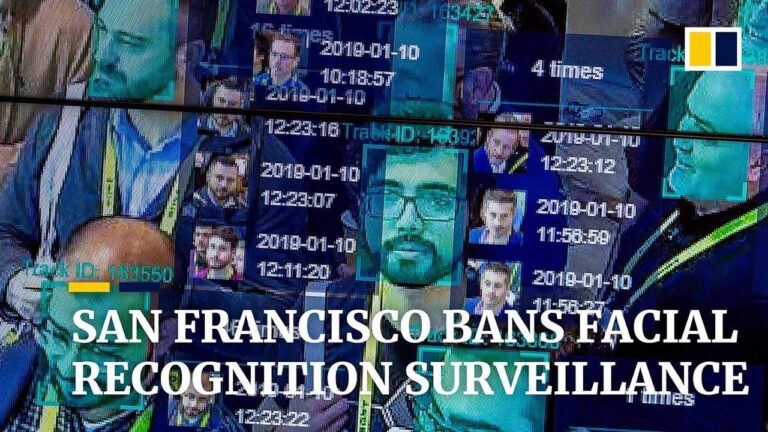San Francisco Pioneers Comprehensive Ban on Facial Recognition Technology
In a historic move, San Francisco has become the first major U.S. city to enforce a full prohibition on the use of facial recognition technology by municipal agencies. This decisive action responds to mounting apprehensions about privacy infringements, systemic biases, and the unchecked expansion of surveillance tools. Advocates emphasize that without stringent regulations, facial recognition systems risk perpetuating inaccuracies and disproportionately impacting vulnerable populations. City leaders underscore the importance of safeguarding civil rights while promoting transparency in governmental technology deployment.
The ordinance establishes a framework that other cities might emulate, featuring:
- Ban on facial recognition use: All city departments, including law enforcement, are forbidden from utilizing this technology.
- Protection of biometric data: Ensures citizens’ biometric information is not collected or stored without explicit authorization.
- Community involvement: Formation of oversight committees to monitor future technology implementations.
| Technology | San Francisco Policy | Primary Concerns Addressed |
|---|---|---|
| Facial Recognition | Prohibited for city use | Privacy violations, racial bias, false identifications |
| Body-Worn Cameras | Permitted with strict guidelines | Transparency, accountability |
| Automated License Plate Readers | Regulated with usage limits | Surveillance and data retention concerns |
Privacy Issues Motivate San Francisco to Adopt Bold Technology Policy
Responding to escalating worries about mass surveillance and data security, San Francisco officials have enacted a policy banning facial recognition technology across all city agencies. This initiative aims to curb the misuse of biometric data and enhance transparency in governmental technology applications. Privacy advocates have praised the city’s leadership as a model for protecting individual freedoms in an era dominated by digital innovation.
The regulation includes several critical measures to protect residents’ rights:
- Complete ban on facial recognition software within municipal services and law enforcement.
- Mandatory audits and public disclosures regarding any alternative surveillance technologies employed.
- Strict protocols governing the storage, access, and protection of personally identifiable information.
| Policy Feature | Expected Outcome |
|---|---|
| Strengthened Privacy | Limits scope of government surveillance |
| Protection of Civil Rights | Reduces discriminatory impacts in policing |
| Increased Transparency | Enhances public accountability on technology use |
Effects on Law Enforcement and Community Safety
The facial recognition ban presents significant operational changes for San Francisco’s law enforcement agencies. Officers must now rely more heavily on traditional investigative techniques and community engagement, which may not match the rapid identification capabilities of biometric systems. While some critics warn this could slow down investigations, proponents argue it will build stronger public trust by reducing the risk of privacy violations and biased enforcement.
Notable shifts in public safety practices include:
- Greater emphasis on community policing and human intelligence gathering.
- Investment in alternative technologies such as regulated license plate readers and advanced video surveillance.
- Enhanced officer training focused on ethical considerations and observational skills independent of automated tools.
| Operational Aspect | Potential Impact | Adaptation Strategy |
|---|---|---|
| Investigation Efficiency | May decrease due to slower manual identification | Utilize traditional detective work and community tips |
| Public Confidence | Expected to rise amid privacy protections | Foster transparency and community dialogue |
| Officer Skill Development | New competencies required | Implement comprehensive ethics and observation training |
Call for National Evaluation of Facial Recognition Practices
In the wake of San Francisco’s pioneering ban, experts nationwide are advocating for a thorough reassessment of facial recognition technologies. Civil liberties organizations and data privacy experts highlight persistent issues such as:
- Algorithmic bias and errors that disproportionately affect minority groups.
- Intrusive surveillance that threatens individual freedoms.
- Opaque data handling with insufficient public disclosure.
Policymakers and technologists emphasize the urgent need for standardized federal regulations that enforce ethical use, including rigorous audits, mandatory transparency reports, and community participation. Such frameworks aim to balance innovation with constitutional protections.
| Issue | Recommended Action | Anticipated Benefit |
|---|---|---|
| Algorithmic Fairness | Independent validation and certification | Reduce misidentifications and discriminatory outcomes |
| Data Protection | Enforce stricter data retention and access controls | Prevent unauthorized use and breaches |
| Transparency and Oversight | Require regular public reporting | Enhance public trust and accountability |
Conclusion: San Francisco Leads the Way in Privacy Protection
San Francisco’s bold step to ban facial recognition technology within city agencies marks a transformative moment in the ongoing dialogue about privacy, surveillance, and civil rights in America. As other municipalities and states observe this precedent, the city’s policy underscores the growing demand for responsible technology governance. This landmark decision not only challenges the unchecked adoption of biometric surveillance but also sets a benchmark for future legislation and corporate accountability, highlighting the delicate balance between technological progress and the preservation of fundamental freedoms.




